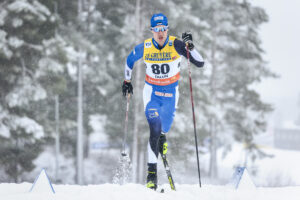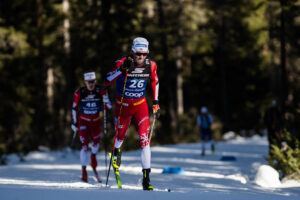Breaking the Silence: Jessie Diggins Opens Up
Jessie Diggins, an Olympic champion and World Cup overall winner, has inspired countless people not only with her inspirational skiing career but also with her bravery in sharing her personal battle with an eating disorder.
As a powerful advocate for mental health, Jessie has opened up about her experience in hopes of breaking down the stigma and encouraging others to seek help. In this interview, Jessie reflects on her journey and her role as an ambassador for the Emily Program, a leading treatment center for eating disorders.
Proxcskiing.com spoke exclusively with Diggins for an in-depth two-part interview.
Personal Journey & Advocacy
Jessie, you’ve been open about your own experience with an eating disorder. What inspired you to share your story publicly, and how has it shaped your role as an ambassador for the Emily Program?
J: “I decided to be so open about my own experiences with mental health and eating disorders because it’s so important to me that people feel empowered to reach out for help when they need it. Mental health has often been such a taboo subject, and this creates barriers to care and support. So, by sharing my own journey, I hope to be the icebreaker for others so they can tell their support system what’s going on and get the help they need.”
“My role with the Emily Program has been to be an ambassador and advocate for mental health, and to be honest, this has been the most impactful and rewarding experience of my entire career. Hearing from so many people that my story inspired them to be able to ask their coach or parents for help, or hearing from coaches that they sought education around eating disorders and now are able to provide resources for their athletes, has been the best part.”
Read more: Jessie Diggins: USA’s Golden Girl talks World Cup, Pressure & Ski Classics
Discovering the Emily Program
When did you first become aware of the Emily Program, and how has partnering with them impacted your personal recovery journey?
J: “Back when I was 18 years old and really struggling with my eating disorder, my parents did a little research and found the Emily Program, an eating disorder recovery program with a warm and caring centre very close to our home. I made the phone call with my mom by my side, and she drove me to my first appointment with them. I found the staff to be so caring, empathetic and patient, and working with their therapists, doctors and sport dietitians saved my life. I also learned so much more about myself and eating disorders in general, and the more I learned, the more I realized that eating disorders are mental health and not a “behavioural choice” or something that deserves the stigma, shame and secrecy that so often accompanies them.”
Diggins continues, “I also learned that, oftentimes, eating disorders aren’t about food or body image at all, but a coping mechanism for someone struggling with other things in their life. For me, it was about feeling a lack of control and struggling with perfectionism. Learning how to be compassionate to myself and letting go of this “all or nothing” way of thinking was crucial to being able to let go of my eating disorder, and I wouldn’t have been able to do this important mental work on my own without the professional help and guidance I received at the Emily Program.”

Eating disorders are often invisible struggles. What advice would you give to someone who may not realize they need help or is afraid to seek support?
J: “I would first say that this is not your fault. There’s still so much stigma and shame around eating disorders, but there shouldn’t be because this isn’t something you did wrong, and it wasn’t your choice. However, now you DO have a choice; you can choose to ask for help and dive into the hard but essential work of recovery. You are worthy of support and compassion, and you deserve to be healthy and be able to fully engage in your life. Oftentimes the first step of making that phone call for help or telling someone close to you is the hardest, but once you let your support people know what’s going on, it’s amazing how much love and kindness they can bring to your recovery process.”
“Many times, we are stopped from seeking the support we need because there’s never a convenient time in our lives; school, work, family all take up time, and people feel they can’t pause their lives in order to get the help they need. But the truth is that, for me at least, I was only able to be a great teammate, partner and able to give back to my community once I took care of my own health needs and was in a good place both mentally and physically. It’s essentially like they say on every flight: “put on your own oxygen mask before helping others”. You can bring so much more good into the world when you own inner world is at peace!”
The Importance of Support
As an athlete, you understand the pressure to maintain a certain image or performance level. How can teammates, coaches, and friends provide support to someone who might be struggling but hasn’t asked for help?
J: “One of the best things coaches can do is right at the start of every training season, open a dialogue with their athletes and educate them about RED-S (relative energy deficiency in sport) as well as eating disorders. Let them know that they can come to them for help at any time. Coaches can look up resources in their area, and two examples in the US are listed below:
- The NEDA website: https://www.nationaleatingdisorders.org/
- Under the header “Help and Support” there is a “find treatment” button to click that brings you to a map of the US, so you can find a treatment option nearest to you.
- Coaches, it’s a great idea to have names and numbers of licensed therapists and nutritionists on hand, so taking the time to explore this website and find options near you if your program, school or University doesn’t have a RDN (registered dietician nutritionist) or counselor on hand.
- In order to find treatment, the site https://www.findedhelp.com is pretty incredible. You can search by location and type of care, but also by your insurance provider.
“It can be hard when someone is struggling but hasn’t asked for help, and athletes can privately express their concern for a teammate to the coach or parents of that person. One way to open the dialogue as a coach is by sitting down with your athlete and saying something along the lines of “hey, I want you to know that I care about you as a whole person, and your health and wellbeing will always come before results. I’ve noticed you’ve seemed a little sad/withdrawn/isolated/quiet/not your normal self lately and wanted to see if there’s anything you’d like to talk about, or if I can help you.” This gives the athlete the knowledge that they’re supported and open up the chance to talk about whatever’s going on, without it being all about their body, food or appearance.”
Part two of the interview with Jessie Diggins will follow on Proxcskiing.com











